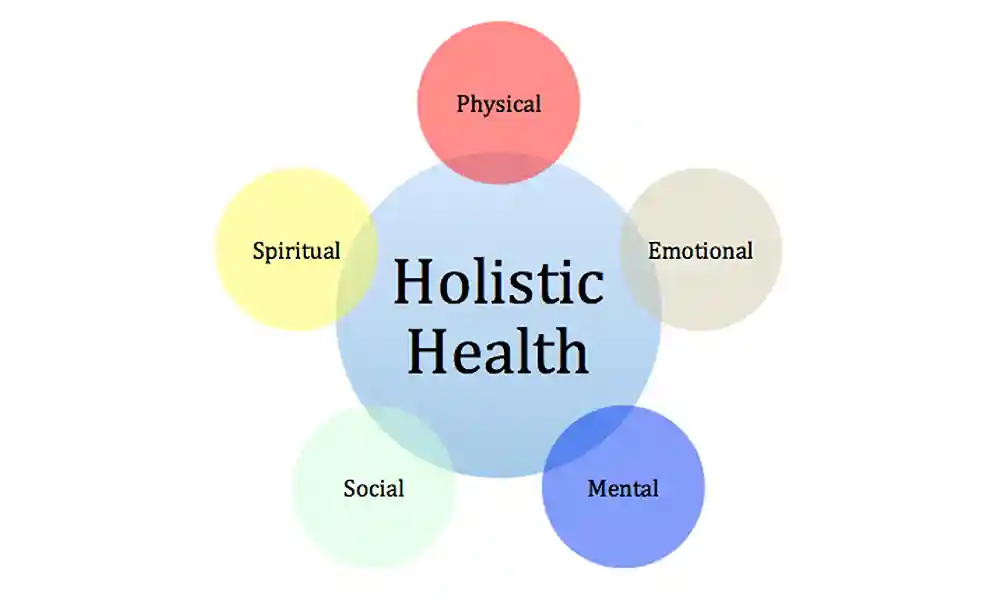Health is not merely the absence of illness; it is a dynamic state of complete well-being.
In a world where the pursuit of well-being is increasingly recognized as essential, understanding the multifaceted nature of health is paramount.
This blog post delves into the various dimensions of health, exploring the importance of a holistic approach that encompasses physical, mental, and social aspects.
What is health?
The World Health Organization (WHO) defines health as “a state of complete physical, mental, and social well-being and not merely the absence of disease or infirmity.”
This definition reflects the holistic nature of health and highlights the importance of addressing its multiple dimensions to achieve a state of well-being.
In contemporary healthcare, there is an increasing recognition of the need for a comprehensive and integrated approach to health that considers not only the treatment of illnesses but also the promotion of positive lifestyle choices, mental resilience, and social connections.
Ultimately, health is a dynamic and ongoing process that involves conscious efforts to maintain and enhance the overall quality of life.
Dimensions of health

1. Physical health
Physical health constitutes the cornerstone of overall well-being.
Regular exercise, balanced nutrition, and sufficient sleep are the pillars that support a robust physical foundation.
Exercise not only strengthens the body but also promotes cardiovascular health, bone density, and mental well-being.
A nutritious diet fuels the body with essential nutrients, fostering optimal organ function and immune system resilience.
Quality sleep, often overlooked, is integral to physical restoration and mental rejuvenation.
2. Mental health
The intricate interplay between physical and mental health underscores the holistic nature of well-being.
Mental health encompasses emotional, psychological, and social aspects that contribute to cognitive functioning and emotional resilience.
Stress management, mindfulness practices, and seeking social support are vital components of maintaining a healthy mind.
Recognizing and addressing mental health challenges is crucial, as it empowers individuals to lead fulfilling lives and navigate the complexities of modern existence with resilience.
3. Social health
Humans are inherently social beings, and social connections are a fundamental aspect of health.
Strong social ties contribute to a sense of belonging, emotional support, and community engagement.
Maintaining healthy relationships, fostering a supportive social network, and participating in meaningful social activities contribute not only to mental well-being but also to the overall quality of life.
Social health is a reciprocal process where individuals both give and receive support, fostering a sense of community and shared purpose.
4. Holistic health
A holistic approach to health recognizes the interconnectedness of physical, mental, and social well-being.
This integrative perspective views health as a dynamic equilibrium that requires attention to all dimensions for optimal vitality.
Practices such as yoga, meditation, and mindfulness exemplify the holistic approach, fostering a balance between mind, body, and spirit.
Holistic health emphasizes the importance of preventive measures, lifestyle choices, and a proactive mindset in sustaining well-being throughout the lifespan.
5. Preventive health
Preventive healthcare is a linchpin to maintaining health and averting potential illnesses.
Regular health check-ups, screenings, vaccinations, and lifestyle modifications contribute to the prevention of diseases and the early detection of potential health issues.
A proactive stance towards health empowers individuals to make informed choices, adopt healthy behaviors, and address risk factors before they escalate.
Determinants of health

The health of individuals and communities is shaped by a myriad of factors that extend beyond the confines of the healthcare system.
These multifaceted influences, known as determinants of health, collectively mold the overall well-being of populations.
In this essay, we will explore the diverse determinants that play pivotal roles in shaping health outcomes, ranging from socioeconomic factors to environmental conditions.
1. Social determinants
Social determinants of health encompass the societal and economic conditions that influence individuals’ ability to lead healthy lives.
This includes factors such as income, education, employment, social support networks, and community safety.
Disparities in social determinants can lead to differential access to resources and opportunities, influencing health outcomes and contributing to health inequalities.
- Income and social status: Economic well-being directly impacts health. Lower income levels are often associated with limited access to healthcare, nutritious food, and safe living conditions, contributing to a higher burden of illness.
- Education: Educational attainment is a powerful predictor of health. Higher levels of education are associated with improved health literacy, better employment opportunities, and healthier lifestyle choices.
- Employment and working conditions: Job security, workplace safety, and the nature of employment have profound health implications. Stressful working conditions, job insecurity, and exposure to occupational hazards can negatively impact well-being.
- Social support networks: Strong social connections and support systems are protective factors for health. Individuals with robust social networks often experience better mental health and have a support system to navigate life’s challenges.
- Community safety and environment: Living in a safe and supportive community contributes to overall health. Access to green spaces, recreational facilities, and low crime rates can positively influence physical and mental well-being.
2. Behavioral determinants
Individual behaviors play a crucial role in shaping health outcomes.
Lifestyle choices, dietary habits, physical activity levels, and substance use contribute to the overall health profile of individuals.
- Diet and nutrition: Dietary choices impact health at various levels. Adequate nutrition is essential for physical development, immune function, and the prevention of chronic diseases.
- Physical activity: Regular physical activity is a cornerstone of health. It contributes to cardiovascular health, weight management, and mental well-being.
- Tobacco and alcohol use: Substance use, including tobacco and alcohol consumption, is a significant behavioral determinant of health. These behaviors are linked to various chronic diseases and adverse health outcomes.
- Sleep hygiene: adequate and quality sleep is essential for overall health. Sleep hygiene, including sleep duration and sleep quality, influences mental and physical well-being.
3. Environmental determinants
The environment in which individuals live, work, and play has profound health implications.
Environmental determinants encompass both the natural and built environments.
- Air and Water Quality: Clean air and water are fundamental for health. Pollution and contaminants can contribute to respiratory diseases, waterborne illnesses, and other health issues.
- Housing and Shelter: The quality and safety of housing impact health. Substandard living conditions, overcrowding, and inadequate shelter can contribute to the spread of infectious diseases and negatively affect mental health.
- Access to healthcare services: Geographical and financial access to healthcare services is a critical determinant. Barriers to healthcare can result in delayed diagnosis, limited preventive care, and unmanaged chronic conditions.
4. Biological and genetic determinants
Individual biological and genetic factors also play a role in determining health outcomes.
Genetic predispositions, family medical history, and inherent physiological characteristics influence susceptibility to certain diseases.
- Genetic factors: Inherited genetic traits can influence an individual’s likelihood of developing specific health conditions. Understanding genetic factors is crucial for personalized medicine and preventive care.
- Biological factors: age, sex, and underlying health conditions contribute to an individual’s health profile. Biological determinants influence susceptibility to diseases and response to treatments.
5. Healthcare system determinants
The structure and functioning of healthcare systems significantly impact health outcomes.
Access to healthcare services, the quality of care, and the efficiency of healthcare delivery are critical considerations.
- Healthcare access: Timely access to healthcare services is vital for preventive care, early diagnosis, and effective management of health conditions.
- Quality of care: The effectiveness and safety of healthcare services influence health outcomes. Quality healthcare involves evidence-based practices, patient-centered care, and the integration of preventive measures.
- Health policy and governance: Government policies and governance structures shape the healthcare landscape. Policies related to public health, healthcare financing, and regulatory frameworks impact the availability and accessibility of healthcare services.
Common health challenges

1. Chronic diseases
Chronic diseases, such as heart disease, diabetes, and certain cancers, pose a significant health challenge globally.
Lifestyle factors, including poor dietary choices, sedentary habits, and tobacco use, contribute to the rising prevalence of these conditions.
Preventive measures involve adopting healthy lifestyle habits, such as maintaining a balanced diet, engaging in regular physical activity, and avoiding tobacco and excessive alcohol consumption.
Regular health check-ups for early detection and management also play a pivotal role.
2. Mental health disorders
Mental health challenges, including depression, anxiety, and stress-related disorders, affect millions worldwide.
Stigma and a lack of awareness often hinder individuals from seeking timely support.
Promoting mental health awareness, fostering open conversations, and providing access to mental health resources are crucial steps in overcoming these challenges.
Supportive communities and workplaces that prioritize mental well-being contribute to creating a stigma-free environment.
3. Infectious diseases
Infectious diseases, ranging from common colds to global pandemics like COVID-19, continue to pose challenges to public health.
Preventive measures include vaccination, practicing good hygiene, and maintaining a robust immune system through a healthy lifestyle.
Global collaboration, early detection, and effective public health interventions are essential in controlling the spread of infectious diseases.
4. Obesity and malnutrition
Obesity and malnutrition represent a dual burden affecting individuals in different ways.
Unhealthy dietary patterns, a lack of physical activity, and socio-economic factors contribute to these challenges.
Addressing these issues involves promoting balanced nutrition, encouraging regular exercise, and addressing socio-economic disparities that impact access to healthy food.
5. Access to healthcare
Disparities in access to healthcare services persist, creating challenges in ensuring that everyone receives timely and quality medical care.
Improving access involves addressing socio-economic factors, strengthening healthcare systems, and promoting policies that prioritize equitable healthcare for all.
6. Substance abuse
Substance abuse, including alcohol and drug addiction, poses substantial health challenges.
Prevention and treatment strategies involve education, awareness campaigns, and rehabilitation programs.
Creating supportive environments that address the root causes of substance abuse is crucial for breaking the cycle of addiction.
7. Aging population
As populations age globally, the prevalence of age-related health challenges, such as dementia and chronic conditions, increases.
Implementing age-friendly policies, promoting healthy aging practices, and ensuring access to geriatric healthcare services are essential steps in meeting the unique health needs of the elderly.
Conclusion
Health is not a destination but a dynamic journey, one that requires conscious effort and a commitment to nurturing the physical, mental, and social aspects of well-being.
A holistic approach to health recognizes the interconnected nature of these dimensions, promoting a sense of balance and vitality.
Embracing the journey to well-being involves making informed choices, fostering positive habits, and seeking support when needed.
Obisesan Damola
Damola is a medical doctor who has worked in the Nigerian healthcare industry for a little over 3 years in a number of primary, secondary, and tertiary hospitals. He is interested in and writes about how technology is helping to shape the healthcare industry. He graduated from the College of Medicine, University of Ibadan, the foremost medical training institution in Nigeria.



